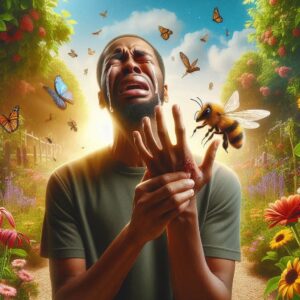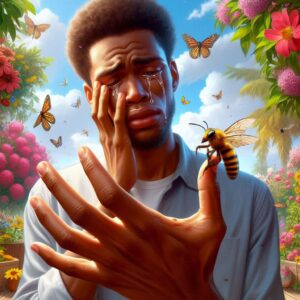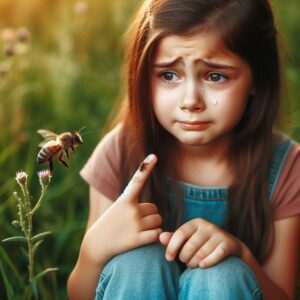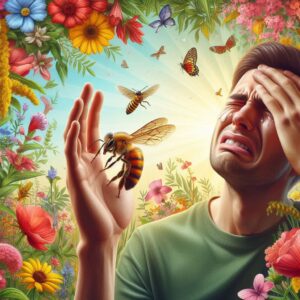泣きっ面に蜂とは?
「泣きっ面に蜂(なきっつらにはち)」は、不運や不幸が重なり、さらに悪いことが起こるという意味のことわざです。すでに泣くような悲しい出来事や辛い状況にある人が、さらに蜂に刺されるという場面を想像させ、一度の不運だけでなく、さらに悪いことが続く状況を表しています。
由来と背景
このことわざは、「泣くような状況にさらに蜂に刺される」という不運の上塗りを比喩として表現しています。泣いているときは精神的にも弱っている状態ですが、そんなときに追い打ちをかけるような出来事が起こると、さらに傷が深まるという意味を含んでいます。
蜂は刺されると痛みを伴い、さらに毒が含まれているため、実際に刺されると悲惨な状態になることから、すでに辛い状況にある人がさらに苦しむ様子を強調しています。
使用例と現代での用法
「泣きっ面に蜂」は、次のような状況でよく使われます。
予想外の悪い出来事が続く場合
例えば、仕事で大きなミスをした後にさらに上司から厳しく叱責される場合や、財布を落とした後に転んでケガをするなどのシチュエーションです。「泣きっ面に蜂だよ」と表現することで、立て続けに不運に見舞われる様子を表します。
災害や事故で被害が重なる場合
例えば、自然災害で被害を受けた直後に、新たな災害が発生するなどのケースです。すでにダメージを受けた状態でさらなる打撃が来ることを、「泣きっ面に蜂」として表現することができます。
心理的な追い打ちの表現
失恋した直後に、さらに友人から心ない言葉をかけられるなどの心理的な痛みが重なる場合にも用いられます。すでに悲しい状態にある人が、さらに打撃を受けるという意味で、「泣きっ面に蜂」という言葉が使われます。
類似の表現
「泣きっ面に蜂」と似た表現には、「弱り目に祟り目」や「踏んだり蹴ったり」といった言い回しがあります。「弱り目に祟り目」は、すでに弱っているときにさらなる不運が降りかかることを意味し、「踏んだり蹴ったり」は複数の災難や不運が続くことを強調しています。
教訓
「泣きっ面に蜂」には、不運が重なることがあるため、逆境でも耐える心構えを持つことの重要性が含まれています。また、人に追い打ちをかけるような行動や発言は避け、他人に対する共感や配慮が必要であることを暗示しています。誰かが困難に直面しているときには、追い討ちをかけるようなことをせず、むしろ支えたり励ましたりすることの大切さを教えてくれることわざです。
「泣きっ面に蜂」とは、すでに不運に見舞われている状態でさらに悪いことが続く様子を表したことわざです。この言葉には、辛い状況にあっても粘り強く耐える心の重要性や、他人への思いやりが必要であるという教訓が含まれています。不運が重なっても冷静に対処しようという姿勢を持つことが大切であると教えてくれる表現です。
The proverb “nakitsutsura ni hachi” (“Bee stings while crying”) means that bad luck or misfortune will compound to make things even worse. It conjures up a scene in which a person who is already in a sad or painful situation that makes him or her cry is further stung by a bee, and represents a situation in which not only one bad luck but even worse things continue to happen.
Origin and Background
This proverb is a metaphor for the bad luck of being stung by more bees in a crying situation. When you are crying, you are in a state of mental weakness, and when an event occurs that follows such a situation, it implies that the wounds will deepen even more.Since bees are painful when they sting and, moreover, contain venom, the actual sting is disastrous, emphasizing the further suffering of a person who is already in a difficult situation.
Usage Examples and Modern Usage
Crying bees” is often used in the following situationsWhen unexpected bad events follow.
For example, when a person is reprimanded more severely by his/her boss after making a major mistake at work, or when a person falls and gets injured after dropping his/her wallet. The expression “It’s a crying shame,” indicates that you are hit by a series of bad luck.When the damage is compounded by a disaster or accident
For example, this is the case when a new disaster occurs immediately after the damage caused by a natural disaster. The expression “a bee on the tear” can be used to describe a further blow to an already damaged situation.Expression of psychological follow-up
It is also used in cases where psychological pain is compounded immediately after a broken heart, such as when a friend speaks to you in an even more heartbreaking manner. The term “crying bee” is used in the sense that a person who is already in a sad state is dealt a further blow.Similar expressions
Similar expressions to “weepy bee” include the phrases “weak eyes are possessed” and “tread on them”. Weakness is cursed” means that more bad luck will befall you when you are already weak, while ‘tread on it’ emphasizes that more than one calamity or bad luck will follow.Lesson learned.
The “crying wolf” includes the importance of being prepared to endure even adversity, as bad luck can compound. It also implies the need to avoid actions and statements that drive people to the brink, and to have empathy and consideration for others. When someone is facing difficulties, the proverb teaches us the importance of not trying to push them away, but rather to support and encourage them.Conclusion
The saying, “Crying wolf,” describes how bad things continue to get worse when you are already suffering from bad luck. This phrase contains a lesson about the importance of perseverance in difficult situations and the need to be considerate of others. This expression teaches us that it is important to have a calm attitude to deal with bad luck.
AIが描いた「泣きっ面に蜂」
YouTube(動画)
AIが描いたイメージ(画像)







コメント